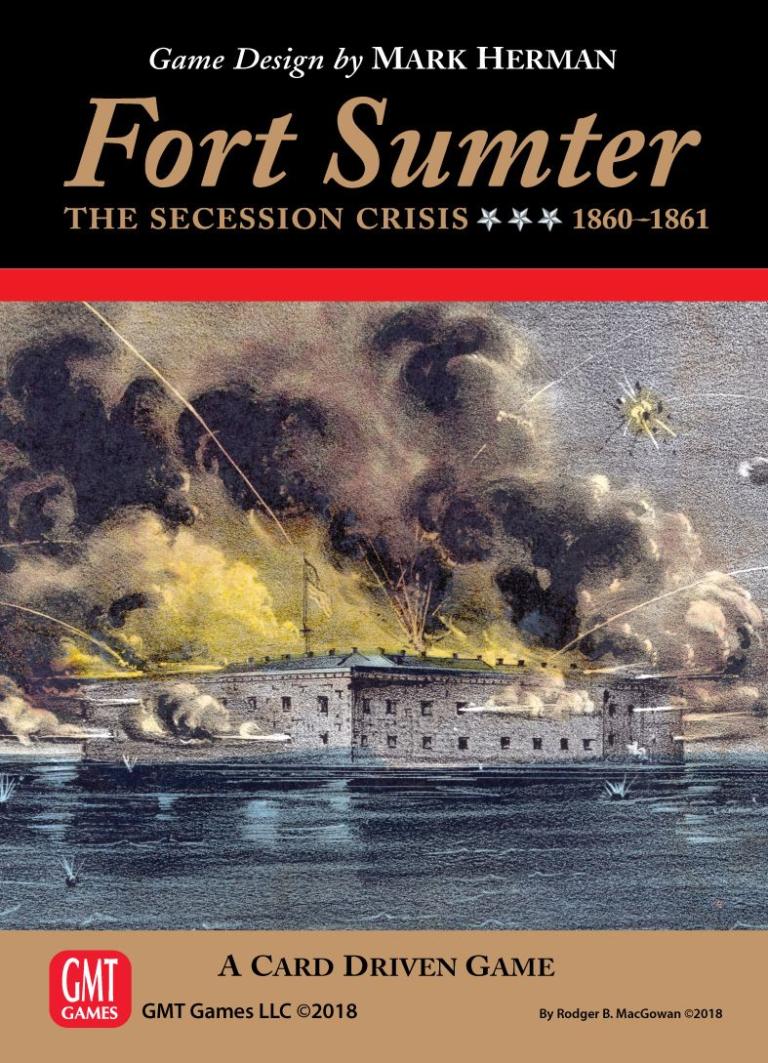Fort Sumter: The Secession Crisis, 1860-61

Fort Sumter: The Secession Crisis, 1860-61
Description from the publisher:
Fort Sumter is a two-player Card Driven Game (CDG) portraying the 1860 secession crisis that led to the bombardment of Fort Sumter and the American Civil War. Fort Sumter is a small footprint game (11x17” mounted map) that takes approximately 25-40 minutes to play. The game pits a Unionist versus a Secessionist player. Each player uses the area control mechanic pioneered in Mark Herman's We The People design and immortalized in Twilight Struggle to place, move, and remove political capital. The location of political capital determines who controls each of the four crisis dimensions (Political, Secession, Public Opinion, and Armaments). After three rounds of play, the game culminates in a Final Crisis confrontation to determine the winner.
The heart of the Fort Sumter design is Mark's CDG system where you use Strategy cards for their value or historic event to acquire political capital from the crisis track. Political capital tokens are used to compete for control of the twelve map spaces. Here the likes of William Lloyd Garrison, Sam Houston, Jefferson Davis, and Harriet Beecher Stowe walk on stage, while the Southern states dissolve the Union.
The twelve map spaces are grouped into the four dimensions of the crisis. You gain a victory point each round that you control a dimension’s three spaces. For example, the Armaments dimension is characterized by Federal Arsenals, Fort Pickens, and of course, Fort Sumter. In addition, each round you score a victory point for controlling your secret objective space. But beware; either player can score active objective spaces. At the end of the dual Presidential inaugurations (round three) a new Final Crisis mechanic drives the game to its hotly contested conclusion.
Utilizing a new Final Crisis Series mechanic, you may accelerate the crisis by breaching zones (escalation, tension, final crisis) that yield bonus political capital. However, beware, as the first person to breach the final crisis zone gains political advantage, yet loses victory point ground. Each game ends with a Final Crisis, where cards set-aside during the three rounds complete your final political maneuvers that determine the winner.
Fort Sumter is a two-player Card Driven Game (CDG) portraying the 1860 secession crisis that led to the bombardment of Fort Sumter and the American Civil War. Fort Sumter is a small footprint game (11x17” mounted map) that takes approximately 25-40 minutes to play. The game pits a Unionist versus a Secessionist player. Each player uses the area control mechanic pioneered in Mark Herman's We The People design and immortalized in Twilight Struggle to place, move, and remove political capital. The location of political capital determines who controls each of the four crisis dimensions (Political, Secession, Public Opinion, and Armaments). After three rounds of play, the game culminates in a Final Crisis confrontation to determine the winner.
The heart of the Fort Sumter design is Mark's CDG system where you use Strategy cards for their value or historic event to acquire political capital from the crisis track. Political capital tokens are used to compete for control of the twelve map spaces. Here the likes of William Lloyd Garrison, Sam Houston, Jefferson Davis, and Harriet Beecher Stowe walk on stage, while the Southern states dissolve the Union.
The twelve map spaces are grouped into the four dimensions of the crisis. You gain a victory point each round that you control a dimension’s three spaces. For example, the Armaments dimension is characterized by Federal Arsenals, Fort Pickens, and of course, Fort Sumter. In addition, each round you score a victory point for controlling your secret objective space. But beware; either player can score active objective spaces. At the end of the dual Presidential inaugurations (round three) a new Final Crisis mechanic drives the game to its hotly contested conclusion.
Utilizing a new Final Crisis Series mechanic, you may accelerate the crisis by breaching zones (escalation, tension, final crisis) that yield bonus political capital. However, beware, as the first person to breach the final crisis zone gains political advantage, yet loses victory point ground. Each game ends with a Final Crisis, where cards set-aside during the three rounds complete your final political maneuvers that determine the winner.
Player Count
2
Playing Time
20
-
40
Age
14
Year Released
2018
